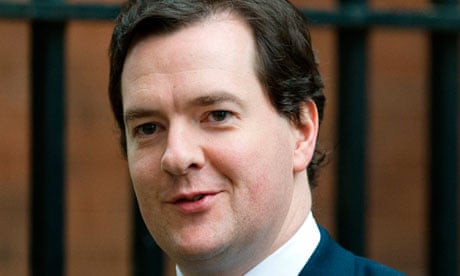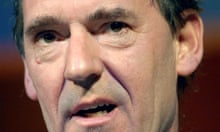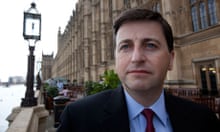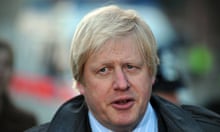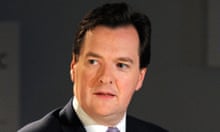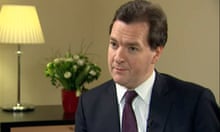George Osborne is under pressure to tear up his austerity programme after Boris Johnson called on the government to drop its "hair-shirt, Stafford Cripps" agenda and Liberal Democrat leaders demanded a spending boost in the spring budget.
Speaking in Davos on Friday shortly after the release of figures showing the economy was again contracting, the London mayor said it was time to "junk the rhetoric of austerity" and instead take steps to boost confidence and spending.
The Lib Dem leader, Nick Clegg, who has for the first time conceded that the government cut investment spending too quickly after it arrived in office, was last night understood to have been swayed during a meeting with the business secretary, Vince Cable, to thrash out proposals in the next budget to spur growth.
On the table will be plans to cushion the blow of local authority budget cuts by allowing councils to borrow more freely to build new homes. It has been estimated that if borrowing caps were removed councils could build 60,000 homes over the next five years. Cable is also urging fresh proposals to make the state-owned banks lend, and has gone public on a call to change the inflation target.
Senior cabinet members are saying it is a racing certainty that the economy will suffer a triple-dip recession, requiring a further first quarter of negative growth.
Figures for the last three months of 2012 showed the UK was again heading into recession after the economy dipped 0.3%. The economy has contracted in four of the last five quarters and another dip in the period up to March, which is possible after the heavy snow, would lead to a third recession in four years. Amid heightened concern that the worse than expected growth figures will result in the UK losing its AAA credit status, the Office for National Statistics also found itself in the middle of a row over its survey methods. The ONS said two thirds of the downturn could be attributed to a steep fall in North Sea production, despite figures from the energy department and industry bodies showing a significant rise.
Johnson did not directly challenge the chancellor but was critical about the gloomy rhetoric from the Bank of England, saying the language of cuts was "not terribly useful in this sort of climate".
"There is huge potential in the UK. It is important we have the spirit of confidence. Some of the mutterings from Threadneedle Street are not the stuff to give the troops." He added: "We need investment in housing and transport, things that make a big difference."
Johnson said he supported Osborne's deficit-reduction strategy, but said savings could be made in parts of government that could be spent elsewhere on growth-friendly projects.
"But the hair-shirt, Stafford Cripps agenda is not the way to get Britain moving again," he added. Cripps, the chancellor between 1947 and 1950, used taxes and rationing to limit consumption as the UK tried to revive the postwar economy.
Johnson's optimism is in stark contrast to the Treasury and the Bank of England, which have stressed the need for patience. Osborne said he would not "run away" from the problems facing the UK economy, reiterating the case made by the Bank of England governor, Sir Mervyn King, that the UK faced a "bumpy ride" before growth picked up.
The IMF is forecasting the UK economy will grow by 1% this year and by 2% in 2014, but forecasts have repeatedly been shown up as too optimistic, and much will depend on whether the eurozone economy recovers more quickly than expected. The recent stock market rise suggests some expect a return of demand.
Osborne called the GDP figures "a reminder that last year was particularly difficult, that we face problems at home with the debts built up over many years, and problems abroad with the eurozone, where we export many of our products, deep in recession".
He added: "Now we can either run away from those problems or we can confront them. And I'm determined to confront them so we can go on creating jobs for the people of this country."
The shadow chancellor, Ed Balls, said: "Today's news confirms what business leaders, retailers and families have known for many months – that depressed confidence and a chronic shortage of demand mean our economy continues to flat line. This government's failing plan has now seen our economy stagnate for over two years and borrowing is now rising as a result."
Clegg used an interview this week to concede that in 2010 the government should not have cut capital spending as hard as the past Labour government planned. The admission discomforted the Lib Dem chief secretary to the Treasury, Danny Alexander, who denied Clegg had said this, claiming the government had spent £10bn more in capital investment than Labour planned. Labour produced counter-figures.
Clegg's remarks signal another Lib Dem push on capital spending ahead of the 20 March budget. In the past two government economic statements ministers have sanctioned small switches from current to capital spending, but Osborne is looking for further spending cuts in 2015-16, proposals that have led to resistance even from rightwing cabinet ministers. The business department has warned some of the cuts may require another hike in tuition fees.
The Lib Dems face a potentially difficult conference in Brighton just ahead of the March budget. Lord Oakeshott, a former party Treasury spokesman, said: "We Liberal Democrats signed up to the coalition agreement to get growth up and debt down, not to get stagnation and self-inflicted cuts. The Treasury does not understand this is a different type of recession because the banks are not lending. Treasury thinking is stuck firmly in the 20s."
Osborne is also under pressure from rightwing thinktanks which want him to offer tax cuts to boost consumer spending, with money taken from departmental efficiency savings and deeper welfare cuts.
Johnson said he would be publishing his seven-point vision for how the economy of London should look by 2020.
The mayor's new economic adviser, Gerard Lyons, has been working on the proposals, which Johnson said involved: building hundreds of thousands of homes; investing in transport infrastructure; boosting London's growth industries, increasing apprenticeships; low and stable tax rates; a "sensible visa" policy; building a new airport; and changing the language of the economic debate.
